Military Police in Afghanistan
-
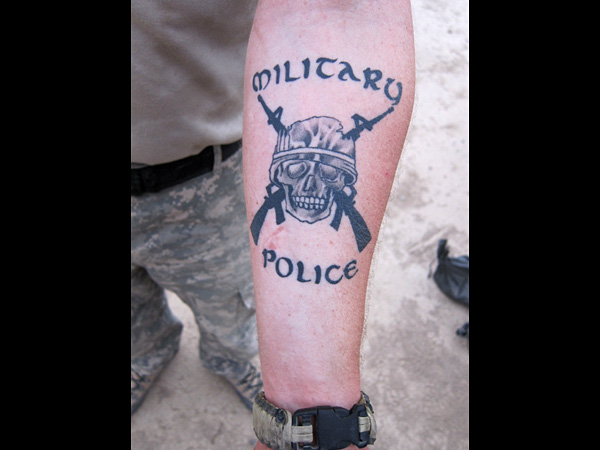 Photograph by Christopher Beam.
Photograph by Christopher Beam.Spc. Matt Affleck of the 372nd MP Company shows off one of his tattoos at a police station in Kandahar City.
-
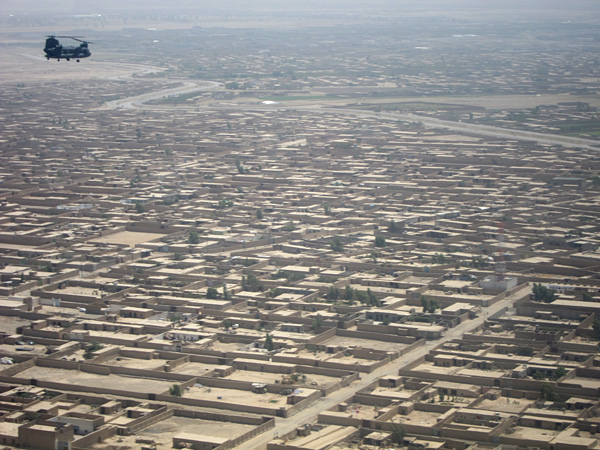 Photograph by Christopher Beam.
Photograph by Christopher Beam.A Chinook helicopter flies over the city of Kandahar, the second largest population center in Afghanistan and the "spiritual birthplace" of the Taliban, where American MPs have been assigned to train and mentor the Afghan National Police. The city is divided into 10 districts, with 17 police stations and checkpoints spread throughout. While the population of Kandahar is largely Pashtun, many of the ANPs are from other tribes and different parts of the country.
-
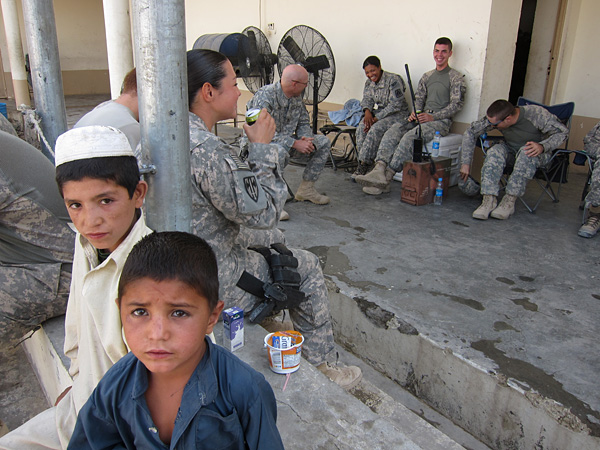 Photograph by Christopher Beam.
Photograph by Christopher Beam.Members of the 1st Platoon, 372nd Company eat breakfast on the porch of Police Substation 5 in Kandahar. Breakfast usually means energy bars and dry cereal, washed down with a can of Rip It energy drink. Two Afghan boys come to the station every morning to pick up trash, presumably to resell.
-
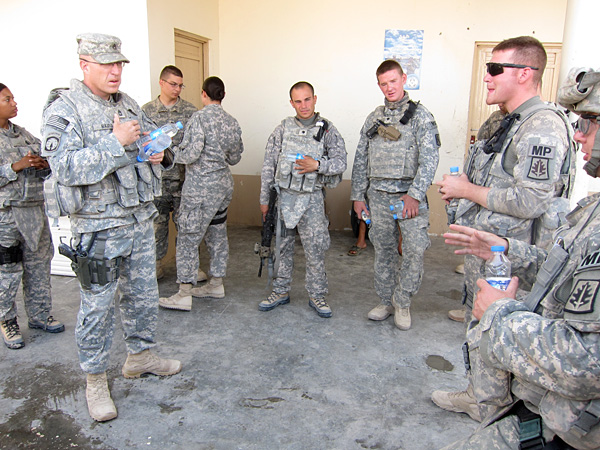 Photograph by Christopher Beam.
Photograph by Christopher Beam.Sgt. 1st Class Joe Baird, head of 1st Platoon, goes over the day's mission. Before every patrol, the platoon reviews emergency procedures, such as escalation of force. The shorthand rule is "Shout, Show, Shove, Shoot, Shoot," as in shout at the person, show your weapon, shove him or use nonlethal force, shoot to warn (like disabling a vehicle), shoot to kill.
-
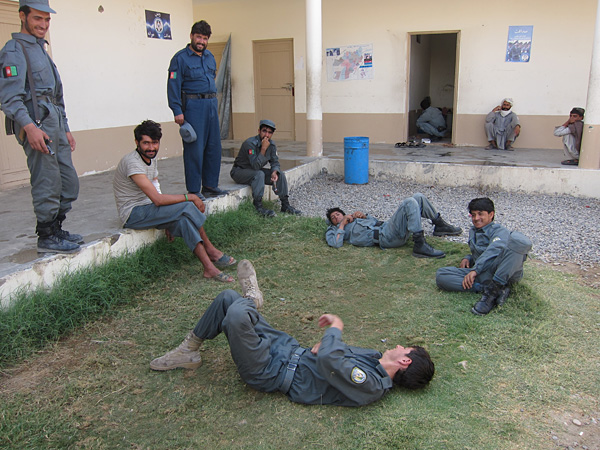 Photograph by Christopher Beam.
Photograph by Christopher Beam.Members of the Afghan National Police relax at Police Substation 5. Muslims fast by day during Ramadan. The ANP are therefore less willing than the Americans to go out on patrol, opting for night patrols instead. The MPs were generally respectful of the holiday but groused that the ANPs exploited it to work less.
-
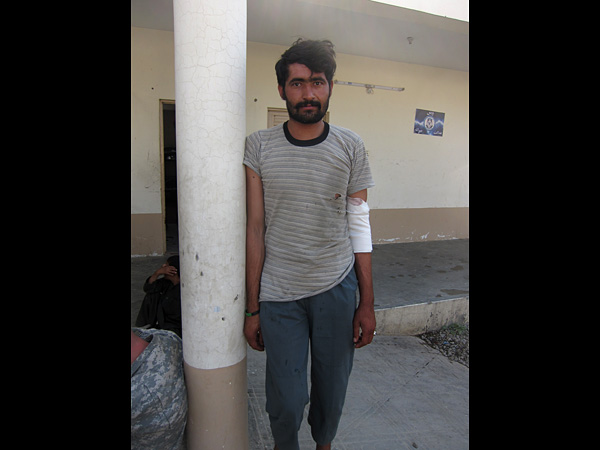 Photograph by Christopher Beam.
Photograph by Christopher Beam.Like many ANPs, Pir Mohammed, known to the MPs as "Captain Hook," is from outside Kandahar, in his case Oruzgan Province. His father gets death threats and extortion demands from the Taliban because his son is in the police force, Mohammed says. Mohammed's arm is bandaged because of injuries from a motorcycle wreck. A few weeks after I left, he accidentally shot himself in the foot.
-
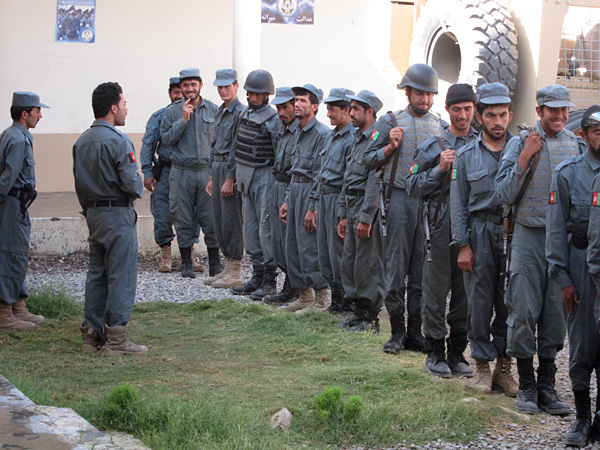 Photograph by Christopher Beam.
Photograph by Christopher Beam.To become an Afghan policeman, you don't have to go to the police academy. (Fewer than half of the ANPs in the city of Kandahar have.) First you get your gun and patrol schedule, then you get in line for the academy. Discipline is often lax as a result. The ANP recruits new policemen mainly by word of mouth: If someone on the force vouches for you, you're in.
-
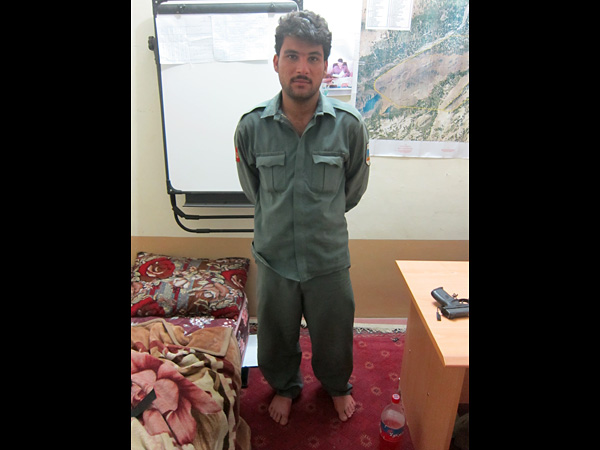 Photograph by Christopher Beam.
Photograph by Christopher Beam.Mohammed Nasir, 25, assistant commander of Police Substation 5. The station's commander decided to take all of Ramadan off, leaving Nasir in charge of several dozen policemen. Nasir grew up in Kandahar but fled to Pakistan with his family when the Taliban took power in the late '90s. He returned in 2001 and became a police officer. On the wall behind Nasir's desk is a photo of himself sitting at his desk.
-
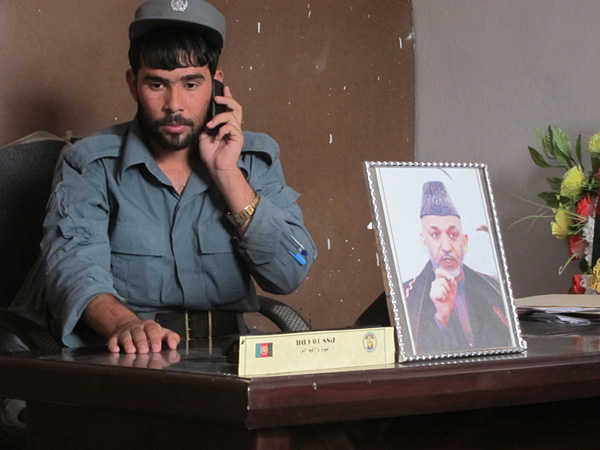 Photograph by Christopher Beam.
Photograph by Christopher Beam.Ali Ahmad Hakimi, the 23-year-old chief of Police Substation 10, fields a phone call. The station doesn't have landlines, so Hakimi serves as a one-man 911 dispatcher. Literacy rates are low in the ANP, perhaps explaining the upside-down placard on his desk.
-
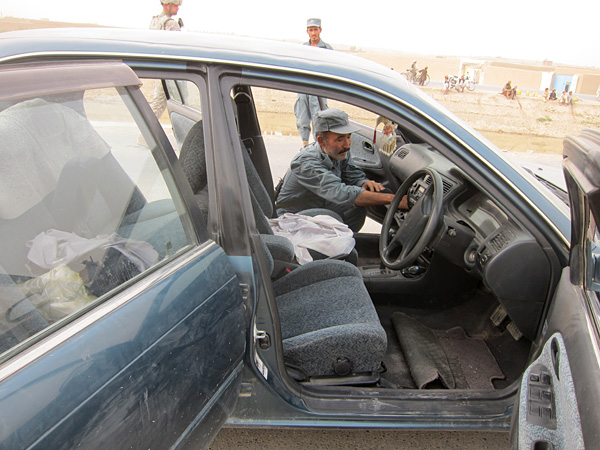 Photograph by Christopher Beam.
Photograph by Christopher Beam.An ANP conducts a car search outside Police Substation 10. The ANPs are taught to search thoroughly, looking under seats, in glove compartments, and in wheel wells. "Why do you only do this when the Americans are around?" one Afghan asked an ANP when he was stopped at a checkpoint. An American MP said this was not the case.
-
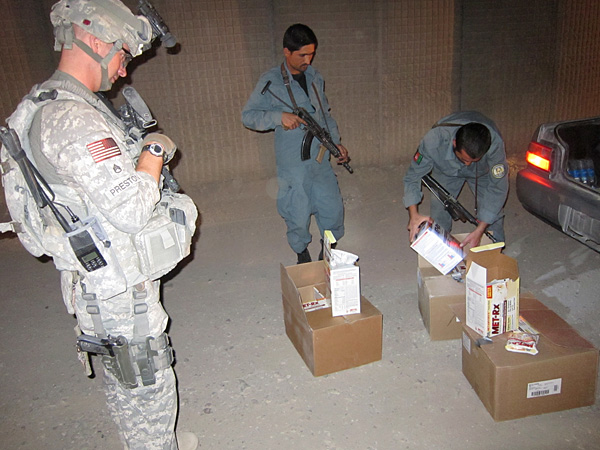 Photograph by Christopher Beam.
Photograph by Christopher Beam.ANPs search a car while an American MP supervises. The ANPs discover several boxes of MetRx protein bars. The four men in the car say they are bodybuilders.
-
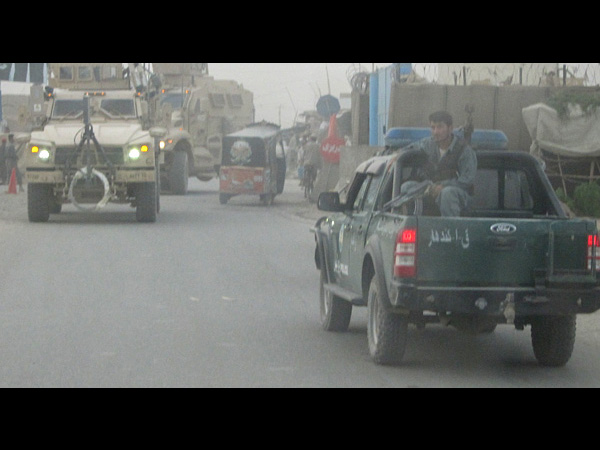 Photograph by Christopher Beam.
Photograph by Christopher Beam.The disparity between American and Afghan equipment and technology is almost comical. MPs drive convoys of giant mine-resistant armored vehicles. Each American is strapped in with a five-clip seatbelt and protected by layers of anti-ballistic steel. The ANPs, meanwhile, ride around in Ford pickup trucks. As a result, the Taliban has focused its attacks on "soft target" ANPs instead of "hard target" Americans, and ANP casualties far outnumber those on the American side.
-
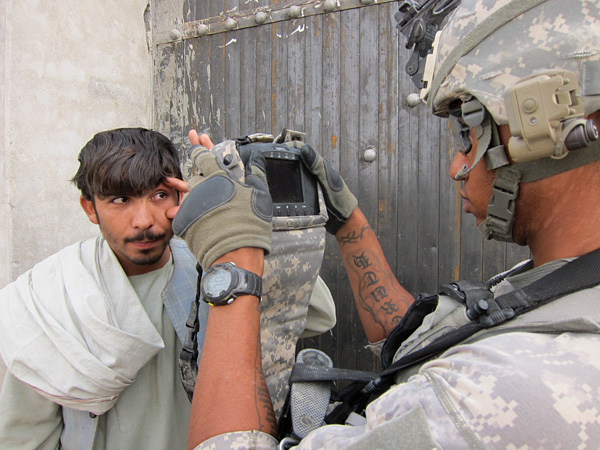 Photograph by Christopher Beam.
Photograph by Christopher Beam.Sgt. Christopher Weaver scans the retina of an Afghan man at a Kandahar traffic checkpoint using a HIIDE biometric scanner. (HIIDE stands for Handheld Interagency Identity Detection Equipment.) The man's name, fingerprint, headshot, and retina scan then become part of a national database and can be cross-checked with lists of suspected insurgents.
-
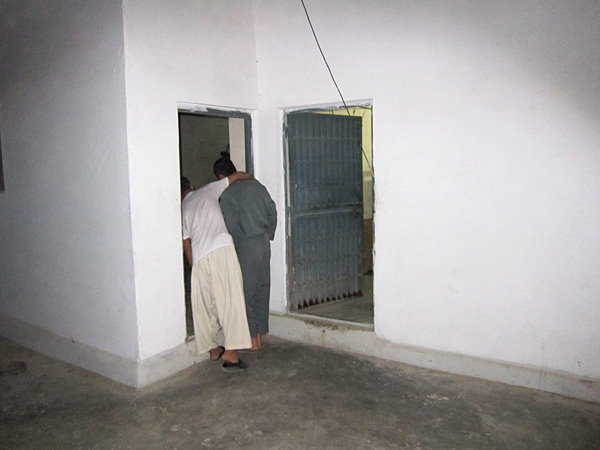 Photograph by Christopher Beam.
Photograph by Christopher Beam.Two Afghan police retreat into a room on a Thursday night, known among soldiers as "Man-Love Thursday." Hand-holding is common among Afghan men and doesn't have sexual connotations. But Americans say they see ANPs engaging in more overtly sexual acts on Thursday nights, just before Friday, a holy day in Islam.
-
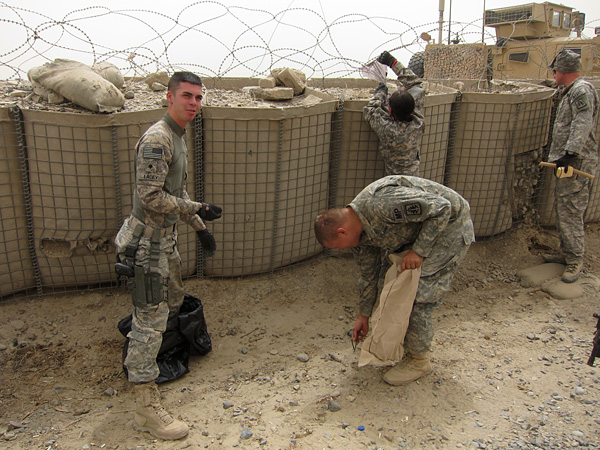 Photograph by Christopher Beam.
Photograph by Christopher Beam.American MPs pick up trash at a police checkpoint near the Tarnak Bridge. Military police like to say that "MP stands for multipurpose." Sometimes their commanders stretch the definition. "Make sure the caption says 'medic,' " says Spc. Frank Lacey, the platoon's medic. Behind him, Spc. Amber Wardell cuts down a pair of men's briefs from the concertina wire.
-
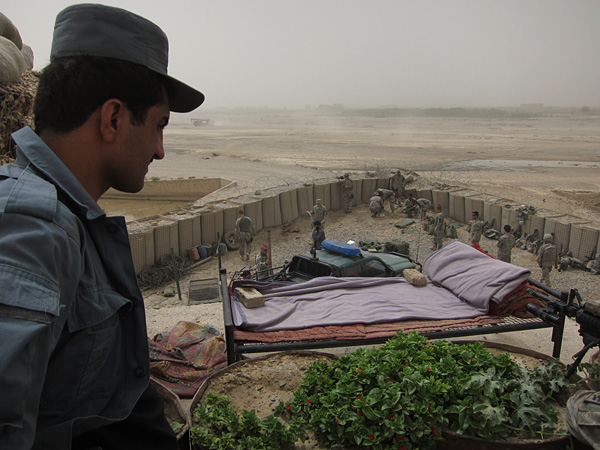 Photograph by Christopher Beam.
Photograph by Christopher Beam.An Afghan policeman watches from the roof of a checkpoint while American MPs pick up trash and fill sandbags. Capt. Fred Wasser tried to explain to the ANPs that they can't put their beds on the roof, where they're exposed to enemy fire.
-
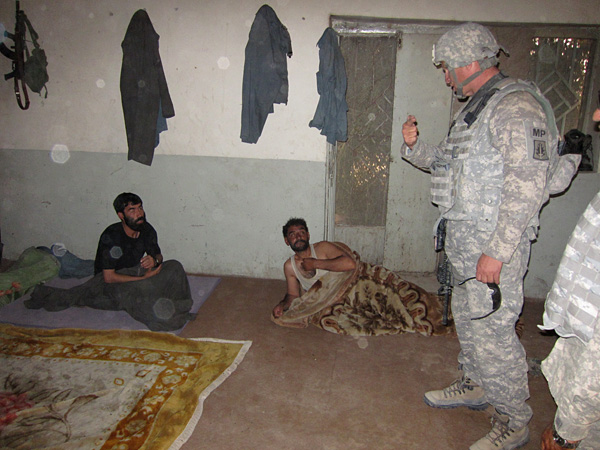 Photograph by Christopher Beam.
Photograph by Christopher Beam.Staff Sgt. Ronald Ketterman upbraids ANPs for sleeping while American MPs pick up trash and fill sandbags outside. "Get the fuck out, let's go," says Ketterman. It's Ramadan, which means the ANPs fast during the day. "Fasting does not mean you don't work," says Ketterman. "Stop acting like a woman. Go earn your money."
-
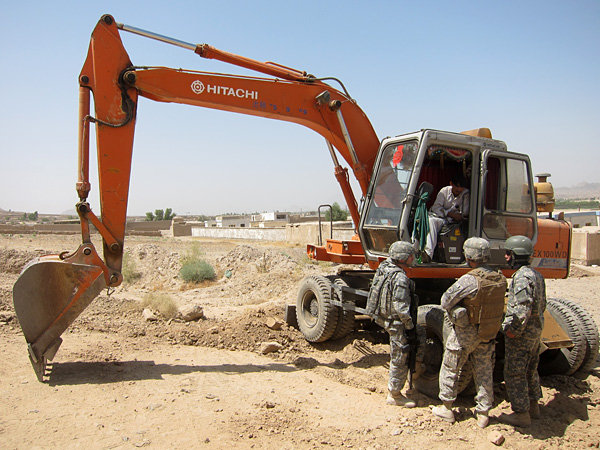 Photograph by Christopher Beam.
Photograph by Christopher Beam.Civil affairs officers ask an excavator operator about the road he's been hired to build. It's unclear how much progress the crew has made since construction began 10 days earlier.
-
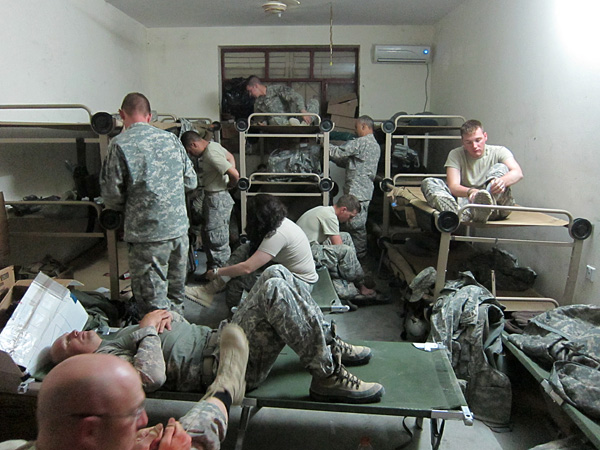 Photograph by Christopher Beam.
Photograph by Christopher Beam.The MPs of 1st Platoon drag themselves out of their triple-decker bunk beds after new orders come in at 2 a.m.
-
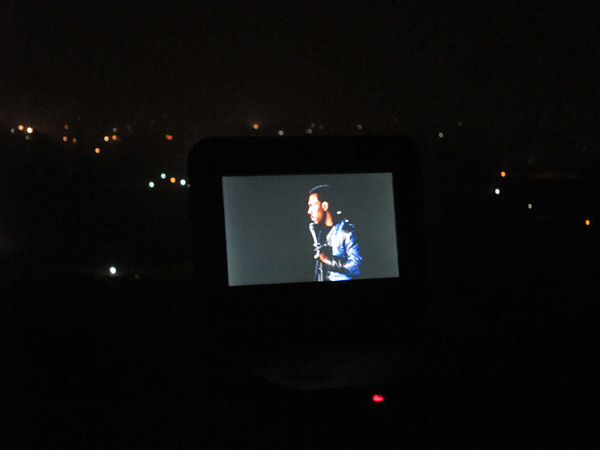 Photograph by Christopher Beam.
Photograph by Christopher Beam.MPs watch Eddie Murphy's Raw while on duty in a guard tower at Police Substation 9.
-
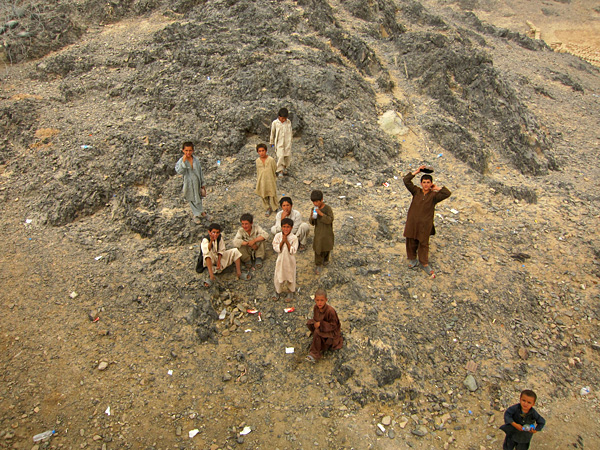 Photograph by Christopher Beam.
Photograph by Christopher Beam.Afghan children gather at the base of a guard tower at Police Substation 9. Kids will spend hours trying to communicate with soldiers, exchanging gifts (hats, pens, juice boxes), and making lewd gestures. Sometimes the kids throw rocks. Occasionally, soldiers do, too. "Our interpreter says it's a game," says one corporal. "But I don't think it's a game."
-
 Photograph by Christopher Beam.
Photograph by Christopher Beam.After an IED goes off in District 9, 1st Platoon arrives to find the ANP preparing to haul off a fruit cart that was carrying the IED. The ANPs agree to wait while the Americans swab it for explosives.
-
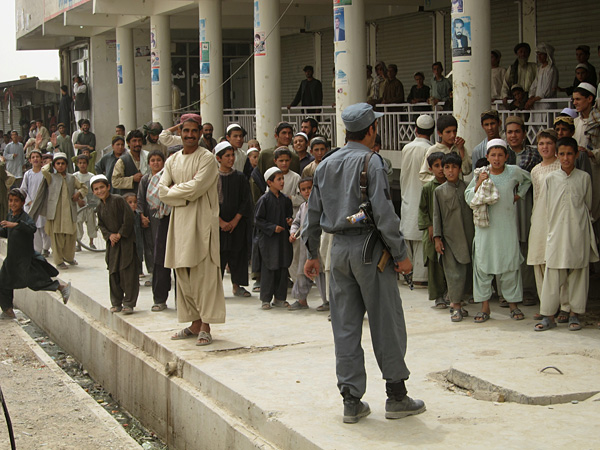 Photograph by Christopher Beam.
Photograph by Christopher Beam.An ANP soldier, rock in hand, keeps kids away after an IED went off in District 9.
-
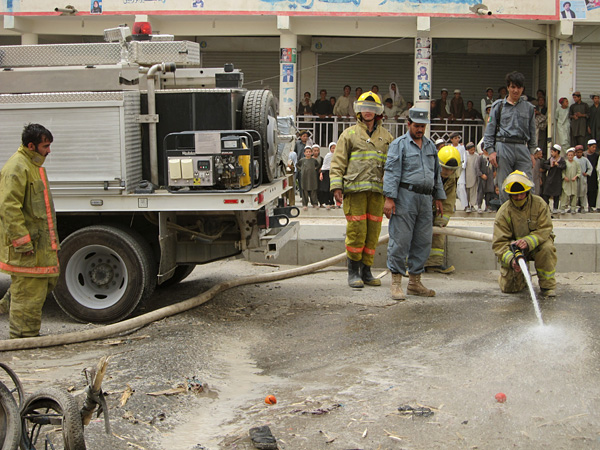 Photograph by Christopher Beam.
Photograph by Christopher Beam.Afghan firefighters spray down the street where the IED exploded. The Americans wanted to block off the area, take pictures, and search for evidence that might help them figure out who set the bomb. The Afghans' priority was to clear the road and get traffic moving again. "They don't want the public to find out about this," explained an interpreter.
-
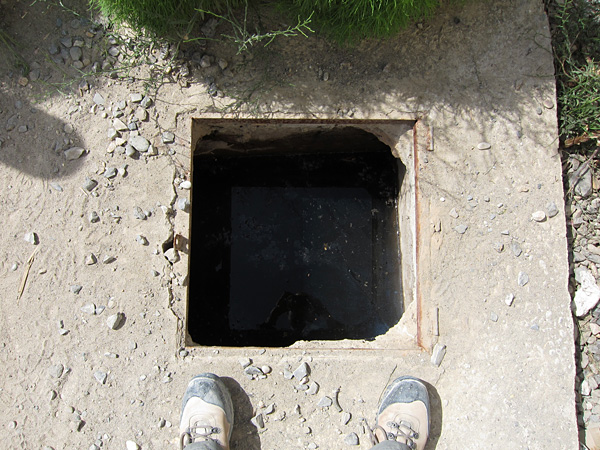 Photograph by Christopher Beam.
Photograph by Christopher Beam.The outhouses and squat toilets at Police Substation 5 all connect to the same open-air septic tank.
-
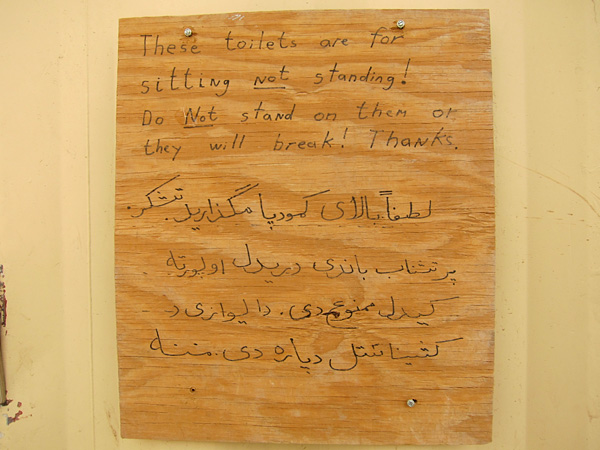 Photograph by Christopher Beam.
Photograph by Christopher Beam.A sign on the entrance to the bathroom at Forward Operating Base Walton, where both Americans and Afghans live. The toilet seats sometimes have footprints on them.
-
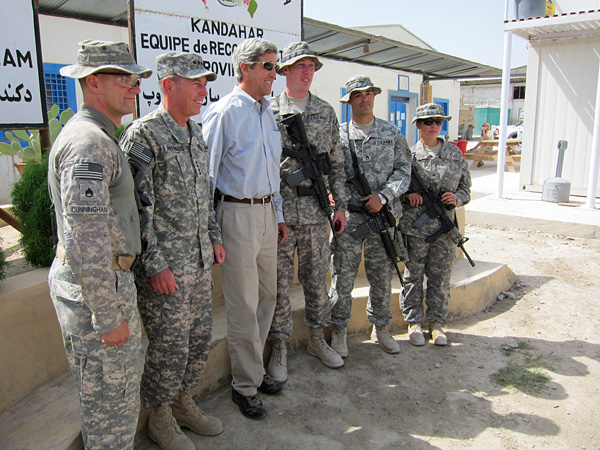 Photograph by Christopher Beam.
Photograph by Christopher Beam.Sen. John Kerry and Gen. David Petraeus pose with soldiers from Massachusetts at Camp Nathan Smith in Kandahar. After a meeting with President Hamid Karzai that day, Kerry called on the Afghan government to work harder to stamp out corruption.
-
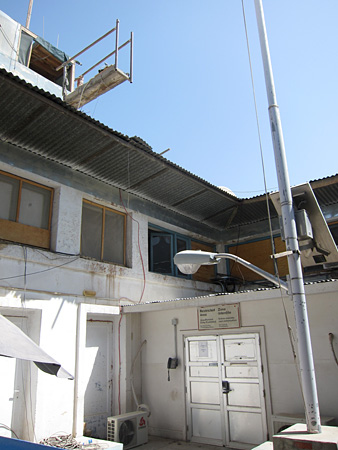 Photograph by Christopher Beam.
Photograph by Christopher Beam.In the middle of Camp Nathan Smith in Kandahar, there's a small square where the Taliban used to hang prisoners. To get to their offices, many American military officers now have to walk beneath the gallows.
-
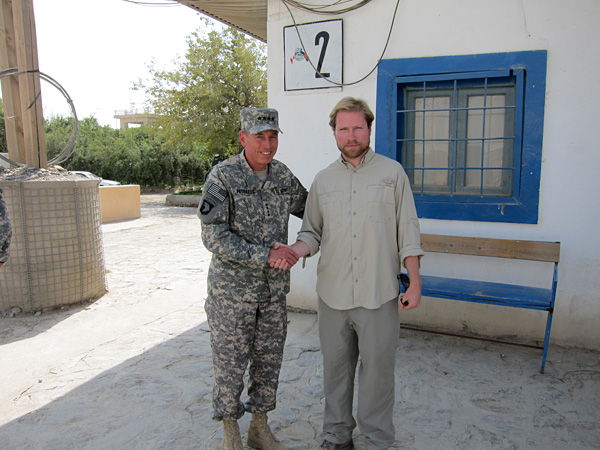
Gen. Petraeus, commander of International Security Assistance Forces and U.S. forces in Afghanistan, with the reporter.